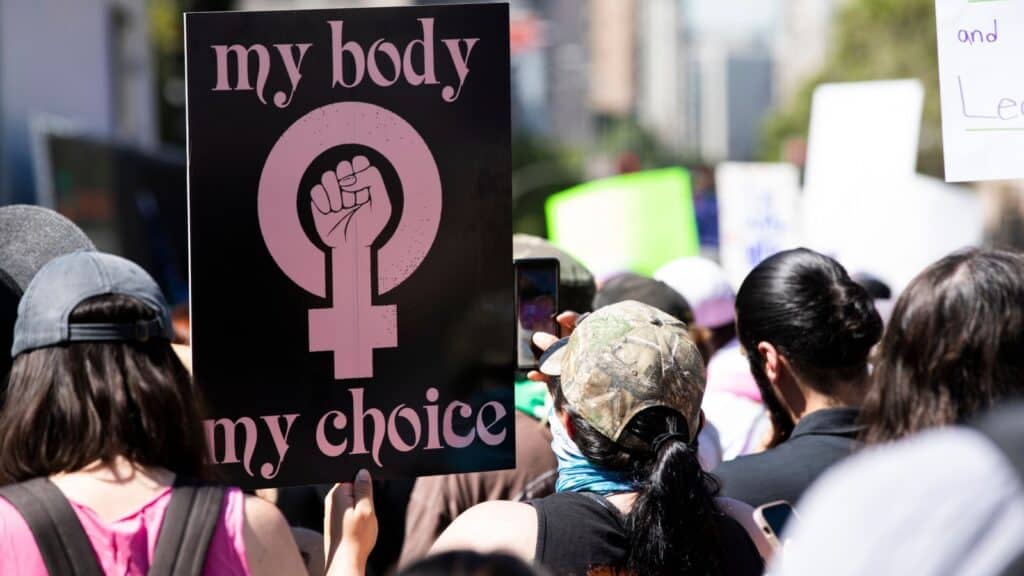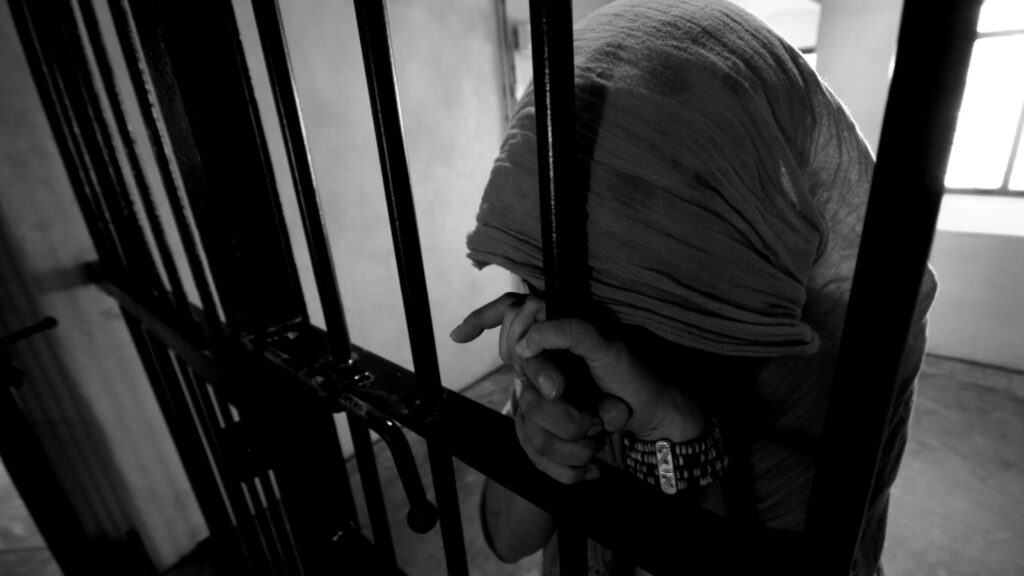Choosing Where to Be Pregnant: Which States Are Safest?

Photo credit Alexander Raths via Shutterstock
by Robin Jaffin and Dede Wilson
The following article “Choosing Where to Be Pregnant”, by Robin Jaffin appeared originally in The Queen Zone on June 28, 2024. It is reposted here with permission.
Women are facing a relentless assault in our nation, with the fundamental right to bodily autonomy hanging precariously in the balance. Increasingly, women are being stripped of their ability to choose whether or not they wish to carry a pregnancy to term, and vital healthcare services that could save lives are being withheld in an attempt to curtail women’s autonomy.
In response, we have identified 25 states where we believe women can reasonably expect conditions conducive to safe pregnancy.
Selection Criteria
Our selection criteria encompass access to maternal healthcare, abortion rights, maternal mortality rates, as well as factors such as access to contraception, post-pregnancy care, and parental leave.
1. Legal and Safe Access to Abortions Up Until the 16th Week: States that allow abortions at least up to the 16th week of pregnancy.
2. Access to Affordable Health Care: States ranked high for healthcare affordability and access.
3. Low Maternal Death Rates: States with lower maternal mortality rates.
4. Access to Contraception: States with high levels of contraceptive use and policies that support access to contraception.
5. Access to Post-Pregnancy Care: States with policies or rankings indicating strong post-pregnancy care.
6. Parental Leave: States with the best parental leave policies.

Top 25 States Based On Criteria (references listed at end of article)
1. California: No restrictions on abortion; high contraceptive access; comprehensive parental leave policies[12][17][19].
2. Massachusetts: High healthcare affordability and access; strong parental leave policies[6][17].
3. Oregon: No restrictions on abortion; high healthcare affordability; strong parental leave policies[4][6][17].
4. Washington: Restricted at viability; high healthcare access; strong parental leave policies[4][17].
5. New York: 24 weeks abortion limit; highest healthcare spending; strong parental leave policies[4][17][19].
6. Rhode Island: Restricted at viability; high healthcare access and affordability; strong parental leave policies[6][17].
7. Connecticut: Restricted at viability; high healthcare access; strong parental leave policies[4][17].
8. New Jersey: 24 weeks abortion limit; strong parental leave policies funded by payroll deductions[4][19].
9. Vermont: No gestational limit on abortion; strong parental leave policies[4][19].
10. Maryland: 24 weeks abortion limit; moderate healthcare affordability; strong parental leave policies[4][6][19].
11. Maine: No restrictions on abortion; strong parental leave policies[4][19].
12. Colorado: No restriction on abortion; strong parental leave policies[4][19].
13. Nevada: No specific limit mentioned; strong contraceptive access policies[12].
14. Delaware: High contraceptive access; strong healthcare policies[20].
15. Iowa: 22 weeks abortion limit; high contraceptive access[4][20].
16. New Mexico: No specific limit mentioned; high contraceptive access[12].
17. Minnesota: 24 weeks abortion limit; strong healthcare access and affordability[4][17].
18. Hawaii: Fetal viability abortion limit; top state for healthcare outcomes[4][17].
19. Illinois: Restricted at viability; strong healthcare access[4][17].
20. Virginia: Restricted at viability; lowest private health insurance premiums[4][17].
21. Michigan: Fetal viability abortion limit; moderate healthcare access[4][17].
22. Pennsylvania: 24 weeks abortion limit; moderate healthcare access[4][17].
23. New Hampshire: 24 weeks abortion limit; strong healthcare access[4][17].
24. Utah: 18 weeks abortion limit; lowest overall healthcare costs[4][17].
25. Arizona: 15 weeks abortion limit; moderate healthcare affordability[4][6].
These states were selected based on their performance across the criteria, with a focus on those that offer comprehensive reproductive health services, including legal and safe access to abortions, high levels of healthcare affordability and access, lower maternal mortality rates, strong access to contraception, post-pregnancy care, and supportive parental leave policies. It’s important to note that the situation can change due to new legislation, so it’s advisable to check the most current laws and policies.
These 14 States We Would Never Consider Being Pregnant In

Here are 14 States we would never consider being pregnant in. Based on the provided search findings, these states have implemented the most stringent abortion regulations, including near-total bans with minimal exceptions. They have either enacted laws severely restricting abortion access or have trigger laws poised to activate swiftly upon the reversal of Roe v. Wade. These states are enforcing a near-total ban on abortion with very limited exceptions, such as to save the life of the pregnant person or in cases of medical emergency. Some of these bans are being challenged in court but remain in effect.
Below Is A List Of States With The Most Stringent Abortion Laws
1. Alabama[2][5]
2. Arkansas[2][5]
3. Idaho[2][5]
4. Kentucky[2][5]
5. Louisiana[2][5]
6. Mississippi[2][5]
7. Missouri[2][5]
8. Oklahoma[2][5]
9. Texas[2][5]
10. West Virginia[2][5]
11. Indiana[1][5]
12. North Dakota[2][5]
13. South Dakota[2][5]
14. Tennessee[2][5]
We’d Skip These Three Too
Additionally, states like Georgia, Florida and South Carolina have enacted six-week bans, which effectively prohibit abortions after a fetal heartbeat is detected, usually around six weeks of pregnancy[2][6].
It’s important to note that the legal landscape is subject to change due to ongoing court challenges and potential new legislation. Therefore, for the most current information on abortion laws by state, it is advisable to consult the latest resources or legal updates.
The Penalties For Violating Abortion Laws In The Most Restrictive States

The penalties for violating abortion laws in the most restrictive states vary, but they generally include significant fines and prison sentences. Here are some examples from the provided sources:
1. Louisiana
– Administering, prescribing, or providing abortion-inducing drugs: 1-10 years in prison and a fine of $10,000-$100,000[1].
– Performing surgical abortions: 1-10 years in prison and a fine of $10,000-$100,000[1].
– Performing a late-term abortion: 1-15 years in prison and a fine of $20,000-$200,000[1].
– Violating the Louisiana Unborn Child Protection from Dismemberment Abortion Act: up to $1,000 per incidence or occurrence, or imprisoned for not more than two years, or both[19].
2. Arkansas
– Performing or attempting to perform an abortion is an unclassified felony with a fine not to exceed $100,000 or imprisonment not to exceed ten years, or both[2][4].
3. Idaho
– Performing or attempting to perform an illegal abortion: felony punishable by two to five years in prison[5].
– Aiding and abetting an abortion: felony with a fine up to $5,000 and imprisonment from one to five years[5].
4. Alabama
– Committing an abortion is charged as a Class A felony, punishable by up to 99 years in prison[6][7][9].
– Attempting an abortion is charged as a Class C felony, punishable by up to 10 years in prison[7][9].
5. Kentucky
– Violating the abortion law is guilty of a Class D felony, upon conviction, must be imprisoned for not less than one year nor more than five years and can be fined between $1,000 and $10,000[14].
These penalties reflect the strict approach these states have taken towards abortion following the overturning of Roe v. Wade. It is important to note that in many of these states, the laws specify that the woman who has the abortion is not subject to criminal penalties. Instead, the penalties are typically directed at the individuals performing or facilitating the abortion. Additionally, the legal landscape is subject to change, and ongoing legal challenges may affect the enforceability of these laws.
How Do the Most Restrictive US States on Abortion Compare to Global Abortion Penalties?

The penalties for violating abortion laws in the most restrictive states in the United States are severe, often involving significant fines and lengthy prison sentences for providers, and in some cases, for those who assist in the procedure. However, when compared to the global landscape of abortion penalties, the severity and scope of penalties can vary widely, with some countries imposing even harsher penalties, including life imprisonment and the death penalty in extreme cases.
In the most restrictive U.S. states, such as Louisiana, performing or assisting in an abortion can result in prison sentences ranging from a few years to several decades, and in some cases, fines of up to hundreds of thousands of dollars[1]. For example, in Alabama, committing an abortion is charged as a Class A felony, punishable by up to 99 years in prison, while attempting an abortion is charged as a Class C felony, punishable by up to 10 years in prison[6][7].
Globally, the penalties for abortion-related offenses can be even more severe. In some countries, individuals seeking an abortion can face imprisonment, with more than 90 countries having maximum penalties of up to five years of prison time for certain abortion-seekers, and 25 countries imposing sentences of between five and 10 years[3].
In extreme cases, such as in Kiribati, Solomon Islands, Tuvalu, Barbados, Belize, and Jamaica, some abortion-seekers can face life imprisonment.— NBC NEWS
In extreme cases, such as in Kiribati, Solomon Islands, Tuvalu, Barbados, Belize, and Jamaica, some abortion-seekers can face life imprisonment[3]. Additionally, in countries like Mauritania and Morocco, penalties can include prohibitions on the exercise of civic and family rights, and in countries like Iran and Pakistan, penalties can involve payment of “diya” or “qisas” (blood money), reflecting a wide range of cultural and legal approaches to penalizing abortion[2].
Comparatively, the penalties in the most restrictive U.S. states align more closely with the harsher end of the global spectrum, particularly in terms of prison sentences for providers. However, the global context reveals a broader range of penalties, including life imprisonment for abortion-seekers in some countries, which is generally not a penalty imposed in the United States. It’s important to note that while the penalties in the U.S. are severe, the global landscape of abortion penalties includes a variety of punitive measures, some of which extend beyond imprisonment to include financial penalties, labor, and social ostracization[2][3][4].
The Takeaway
The landscape of abortion rights and access to safe maternal healthcare and pregnancy services varies significantly across the United States and around the world, reflecting a complex interplay of legal, cultural, and healthcare factors. Here are the key takeaways from the discussion:
- Variability in Abortion Laws: In the United States, there is a wide range of abortion laws, with some states imposing near-total bans and others maintaining more liberal access. States with the most restrictive laws, such as Alabama, Louisiana, and Arkansas, impose severe penalties for violating abortion laws, including substantial fines and lengthy prison sentences, primarily targeting providers.
- Penalties for Violating Abortion Laws: The penalties for violating abortion laws in the most restrictive U.S. states are severe, with some laws imposing up to 99 years in prison for performing an abortion. These penalties are among the harshest globally, although some countries impose even more severe penalties, including life imprisonment and the death penalty in extreme cases.
- Global Perspective on Abortion Penalties: Globally, the penalties for abortion vary widely, with some countries imposing life imprisonment for abortion-seekers and others incorporating additional penalties such as financial fines and social ostracization. This diversity reflects the wide range of cultural, legal, and religious attitudes towards abortion.
- Access to Safe Maternal Healthcare: Access to safe maternal healthcare is closely linked to abortion rights, as restrictive abortion laws can impact the availability and quality of maternal healthcare services. States and countries with more liberal abortion laws tend to have more comprehensive maternal healthcare services, including access to contraception, post-pregnancy care, and parental leave policies.
- Importance of Comprehensive Reproductive Health Services: The discussion underscores the importance of comprehensive reproductive health services, including legal and safe access to abortions, high levels of healthcare affordability and access, lower maternal mortality rates, strong access to contraception, post-pregnancy care, and supportive parental leave policies. These factors collectively contribute to the health and well-being of individuals seeking pregnancy and maternal healthcare services.
In conclusion, the state of abortion rights and access to maternal healthcare is a reflection of broader societal values and priorities, with significant implications for public health, individual rights, and social justice. The variability in laws and penalties highlights the ongoing debates and challenges surrounding reproductive rights and the need for policies that ensure safe, accessible, and comprehensive healthcare for all individuals.
References
Citations for Top 25 States Based on Criteria
[1] https://wisevoter.com/state-rankings/maternal-mortality-rate-by-state/
[2] https://www.axios.com/2022/05/14/abortion-state-laws-bans-roe-supreme-court
[3] https://www.theguardian.com/us-news/ng-interactive/2023/nov/10/state-abortion-laws-us
[4] https://www.usnews.com/news/best-states/articles/a-guide-to-abortion-laws-by-state
[5] https://www.parents.com/parenting/work/life-balance/maternity-leave-benefits-for-every-state/
[6] https://www.beckershospitalreview.com/finance/states-ranked-by-healthcare-affordability.html
[8] https://www.guttmacher.org/report/state-level-estimates-contraceptive-use-in-us-2019
[9] https://www.nytimes.com/interactive/2022/us/abortion-laws-roe-v-wade.html
[10] https://www.cdc.gov/nchs/maternal-mortality/mmr-2018-2021-state-data.pdf
[11] https://wallethub.com/edu/states-with-best-health-care/23457
[12] https://reproductiverights.org/maps/abortion-laws-by-state/
[13] https://ballotpedia.org/Abortion_regulations_by_state
[14] https://renewbariatrics.com/healthcare-rankings/
[15] https://www.ncbi.nlm.nih.gov/pmc/articles/PMC10122222/
[16] https://www.cdc.gov/nchs/data/hestat/maternal-mortality/2021/maternal-mortality-rates-2021.htm
[17] https://www.moneygeek.com/insurance/health/analysis/top-states-health-care/
[18] https://www.ncbi.nlm.nih.gov/pmc/articles/PMC10318476/
[19] https://www.paycor.com/resource-center/articles/maternity-leave-laws-by-state/
[20] https://www.ncbi.nlm.nih.gov/pmc/articles/PMC9120494/
Citations for These 14 States We Would Never Consider Being Pregnant
[1] https://fullerproject.org/story/how-major-abortion-laws-compare-state-by-state-map/
[3] https://www.npr.org/2022/08/18/1111344810/abortion-ban-states-social-safety-net-health-outcomes
[4] https://www.usnews.com/news/best-states/articles/a-guide-to-abortion-laws-by-state
[5] https://www.context.news/money-power-people/roe-v-wade-which-us-states-are-banning-abortion
[6] https://www.theguardian.com/us-news/ng-interactive/2023/nov/10/state-abortion-laws-us
[7] https://reproductiverights.org/maps/abortion-laws-by-state/
Citations for the Penalties for Violating Abortion Laws in the Most Restrictive States
[5] https://www.hhhealthlawblog.com/idahos-amended-abortion-laws-summary-and-updated-faqs/
[9] https://www.cnn.com/2019/05/15/us/alabama-abortion-law-felony-trnd/index.html
[10] https://time.com/6282288/louisiana-abortion-exceptions-confusion-doctors/
[11] https://lailluminator.com/2022/06/02/louisiana-criminal-penalties-for-abortion/
[15] https://reproductiverights.org/maps/state/idaho/
[16] https://encyclopediaofarkansas.net/entries/abortion-5324/
[17] https://www.findlaw.com/state/alabama-law/alabama-abortion-laws.html
[18] https://www.aclualabama.org/en/legislation/hb-17-repeal-penalty-inducing-abortion
[19] https://legis.la.gov/Legis/Law.aspx?d=1147543
[20] https://time.com/6269586/idaho-abortion-law-minor-access/
Citations for How Do the Most Restrictive US States on Abortion Compare to Global Abortion Penalties?
[2] https://gh.bmj.com/content/8/3/e010405
[5] https://www.cfr.org/article/abortion-law-global-comparisons
[6] https://www.independent.co.uk/-style/women/abortion-rights-uk-usa-bill-nhs-b2071339.html
[7] https://www.ncbi.nlm.nih.gov/pmc/articles/PMC5473035/
[8] https://reproductiverights.org/maps/worlds-abortion-laws/
Authors
 Robin JaffinAs the co-founder and managing partner of the digital media partnership Shift Works Partners, LLC through two online media brands, FODMAP Everyday® and The Queen Zone she has played a pivotal role in promoting dietary solutions for individuals with specific needs in the health and wellness industry as well as amplify the voices and experiences of women worldwide. View all posts
Robin JaffinAs the co-founder and managing partner of the digital media partnership Shift Works Partners, LLC through two online media brands, FODMAP Everyday® and The Queen Zone she has played a pivotal role in promoting dietary solutions for individuals with specific needs in the health and wellness industry as well as amplify the voices and experiences of women worldwide. View all posts  Dede WilsonDédé Wilson is a journalist with over 17 cookbooks to her name and is the co-founder and managing partner of the digital media partnership Shift Works Partners LLC, currently publishing through two online media brands, FODMAP Everyday® and The Queen Zone.View all posts
Dede WilsonDédé Wilson is a journalist with over 17 cookbooks to her name and is the co-founder and managing partner of the digital media partnership Shift Works Partners LLC, currently publishing through two online media brands, FODMAP Everyday® and The Queen Zone.View all posts
Join Us

Join us on this empowering journey as we explore, celebrate, and elevate “her story.” The Queen Zone is not just a platform; it’s a community where women from all walks of life can come together, share their experiences, and inspire one another. Welcome to a space where the female experience takes center stage. Sign up for our newsletter so you don’t miss a thing, Queen!

Wow. Thanks so much for compiling this extremely important information. Women voters unite.